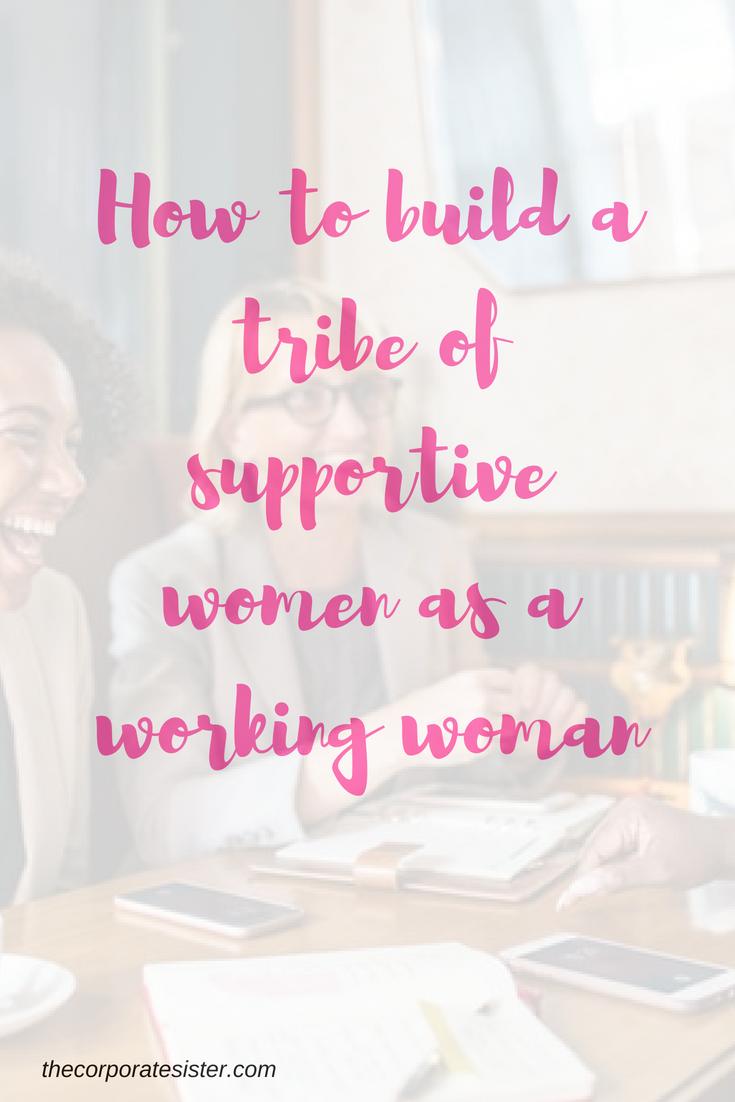
by Solange Lopes | Jun 20, 2018 | Career, Working Mom & Woman Tips
It takes a village. Not just to raise a child, but to live our best lives as women. It’s challenging to be truly successful alone, if possible at all. As much opposition that there seems to be among women, in and outside of the workplace, the truth is, we need each other to be fully flourishing and successful, whatever our definition of success is. As working women, we do need a tribe of supportive women to surround and accompany us on our personal and professional journeys.
As the proverbial independent woman, I was taught that you can accomplish success alone. However, the more I was around other powerful and strong women in their own right, the more I realized that our impact is not diminished but rather multiplied when we’re in the right tribe of women.
Yet, it can be challenging to find the right tribe for us, especially considering the barriers and obstacles imposed on women in and outside of work. From the “Queen Bee” syndrome, which mandates that only one woman can hold the power in a given organization, to the many false stereotypes and preconceptions about women being unable to collaborate and work together, there are indeed many challenges. This is not about being part of a clique or exclusive group of women reminiscent of high school. Rather, it’s about building an empowering circle whose main goal is to help the women in it maximize their potential and fulfill their God-given purpose.

Through my discussions with my women friends and many working women around me, and by experiencing myself the power of being part of a tribe of supportive women, I learnt about what it takes to build it for ourselves. If like me, you’re always looking to build or strengthen a tribe of supportive women around you, these pointers may help:
-
Work on yourself first
Any relationship you may have starts with you! Before even thinking of entering or building a tribe, you must first consider working on yourself. You can’t pour out of an empty cup, neither can you be a full part of any relationship unless you are full yourself! When I say full, I mean filled with your own authenticity, purpose and worth. This is not to say that you must be perfect, no one is. However, you must work on yourself to clean up any mental or spiritual clutter that may affect your relationships with other women, and be accepting of yourself so you in turn can accept others.
One recurring message I heard throughout my youth is that you cannot trust other women. As a result, I grew more distrustful of my peers, which created a block in my relationships with other women for a long time. It took self-exploration and self-work to understand these mental patterns, and eradicate them from my mind. It also took working on my self-esteem and self-worth in order to accept myself as I am, so I in turn could be more accepting of others.
-
Look for leadership characteristics
Building or strengthening a tribe of strong and powerful women requires certain leadership characteristics in all parties involved. You cannot build strong relationships based on weak character. This is the reason why relationships and friendships are so crucial, as they mirror who we are and help us develop into the people we need to be in order to have healthy and fruitful interactions.
This is also why it’s so important to look for leadership characteristics in your fellow tribe sisters. The goal here is to empower each other, so we must all do the work on ourselves. Unfortunately, we also all have seasons during which we may not be a right fit for each other, and it’s ok.
-
Be open-minded
Very often, we miss out on wonderful connections and relationships because we’re not open-minded enough. A tribe of supportive women is made out of all different women with different tastes, likes, dislikes and abilities. The more open-minded we are, the more we can build fruitful and positive relationships that help us empower and strengthen each other.
The most positive relationships are most often those in which opposites are connected and help strengthen each other through their differences. Be open-minded enough to get to know women who do not look like you, do not move or think like you. You may find out that there is such a wealth of perspectives, knowledge and wisdom to be found around us.
-
Don’t be afraid to walk away from relationships that don’t fit
Building a tribe of supportive women also means knowing when to walk away from interactions that are simply not the right fit for us. This is not to condemn anyone, or cast a judgment upon anyone. The reality is we all need to work on different areas of our lives. As we go through different seasons, we must also realize that some relationships and connections, and by extension some tribes, are just for us. We must also muster the courage to walk away from these and seek the tribes that are truly for us.
There’s always some level of guilt associated with walking away from certain relationships. However, it doesn’t have to be a conflicting situation. Rather, it can simply be a peaceful understanding that it may be better to explore other relationships for the time being.
-
Support, not competition!
The point here is to foster a supportive, not a competitive community. Unfortunately, we’ve been conditioned as women to compete against each other, as we were made to believe that there is only room for one of us at a time. This is one of the greatest fallacies of time, which seeks to pin women against each other, and thus diminish our influence and impact.
Instead, seek to build a tribe that is focused on supporting each woman reach their potential and accomplish their purpose.
-
Honesty is key
Honesty is crucial when it comes to building such a tribe. Often, in attempts to protect others or ourselves, we shy away from being our most transparent selves. A solid tribe of women who support each other is one where honesty is the rule and not the exception. Dare to speak up and confront your fellow sisters when necessary, and establish a foundation of trust.
While certain conversations can be hard to be had, it’s important to get past the initial discomfort to address potential or existing issues. It’s also one of the best ways to get to know your fellow sisters and learn to face challenging situations together.
-
Honor yourself
Last but not least, always honor yourself. Being part of a tribe of women doesn’t mean denying oneself. On the contrary, it’s an act of self-love and communal love that says: “I value myself enough to surround myself with strong, supportive women whom I support and who support me in achieving my God-given purpose.”
Now your turn: How have you built your own tribe of supportive women?
To Your Success,
The Corporate Sister.

by Solange Lopes | Jun 11, 2018 | Career
Have you ever cried at work, whether hidden in a bathroom stall or flat out in front of your boss? Have you ever expressed your anger in an explosive way you wish you could take back? Or have you witnessed a co-worker or friend in similar situations? You may have experienced any of these situations which may have required you to manage your emotions at work, whether you or someone else was involved.
As working women, we’re often saddled with the reputation of being “too emotional”. Popular opinion has it that women at work wear their emotions on their sleeves, and for this reason, may not be able to aspire to or hold positions of leadership. As a working woman, I know the importance of managing our emotions at work. From speaking with fellow working women, I also know that many have experienced, either personally or through a relationship, the negative effects of emotions at work.
In the traditional sense, emotions have been heralded as not belonging in the workplace. You’re not supposed to show your emotions at work. Neither are you supposed to talk about them. However, considering that emotions are natural mechanisms of survival as embedded in our biological make-up, how realistic is it to be expected to show no to little emotion at work?

Truth is, both men and women react to emotional stimuli, albeit in different ways. While men tend to explode, women tend to cry. However, as explained by neurologist William Frey, women tend to also carry in their systems a hormone that makes them more prone to crying, also known as prolactin. Yet, women are blamed more at work for expressing their emotions and as such tend to be more emotionally constrained.
What are we then do to as working women to manage our emotions at work? While ignoring your emotions at work is counter-productive, there are ways to manage them so that they help and don’t hinder your career:
-
Know your emotional patterns
Being aware of how you emotionally react is the first step to effectively managing your emotions. What triggers you in and outside of work? How do you tend to react in certain situations? Who are the people who make you react in a more emotional way?
Learning to be mindful of your own emotional triggers and reactions can go a long way towards helping you manage them. It will also help you anticipate highly stressful and emotion-inducing situations or contexts so you can choose the most suitable reaction for yourself. For instance, faced with a colleaugue’s or boss’s demeaning remarks, knowing that this is a trigger will help you decide to step away and grab a coffee in order to calm yourself down first. Even in situations where you may cry or get upset, prepare to discuss the behavior that made you react this way and seek an amicable resolution rather than letting it fester.
-
Do not ignore your emotions
One of the biggest mistakes you can make is totally ignoring your emotions. Burying deep-seated feelings or delaying emotional responses may worsen them in the long run. Acknowledge that you’re experiencing certain emotional reactions and work to understand their roots and origins first. What is it about a certain setting, context or person that creates certain strong emotions in you? Does it relate to a time or experience that you may not have dealt with previously?
It requires strength to recognize your emotions, when you may be tempted to ignore them. Instead, acknowledge them, and consider sharing them with someone you trust as a way of release. You can use this knowledge to devise the best way to react rather than being taken by surprise and reacting out of character.
-
Develop habits that help you balance out your emotions
Experiencing a host of different emtions at work, or anywhere else for that matter, is normal. Additioanlly ,considering the large amount of time we spend at work, it can be hard to avoid our emotions. It’s important then to develop habits and rituals to balance out the impact of some of the storng emotions we may feel at work. Habits such as exercising, meditation, prayer can help instill more happiness and stability in your day-to-day, so as to bring more emotional balance overall.
Having outlets for your talents, skills and interests outside of work can greatly contribute to helping you manage your emotions without denying them. It will also expose you to different environments and various personalities which in turn will teach you the resilience and experience needed to handle other situations at work.
Overall, you must demystify the importance of emotions at work and learn to use these as actual compasses and indicators rather than enemies to be avoided at all costs.
Now your turn: How do you deal with your emotions at work?
To Your Success,
The Corporate Sister

by Solange Lopes | Jun 8, 2018 | Working Mom & Woman Tips
The need for validation is one that many, if not most of us, experience in our work and life. After all, it feels good to be recognized and validated at work and in life by our friends, family, peers and others. In your career, this need for validation may express itself in your need to have your work and accomplishments recognized by your team, managers and others around you. In our personal lives, it comes most often as a need to have our choices, ideas and even personality accepted and validated by others, especially those who are closest to us.
However, this need of validation also comes at a cost, especially for us as working women. It makes us vulnerable to criticism, negative comments, and even jealousy and ill intentions from those around us. In the era of social media especially, where most people sometimes share the most intimate parts of their lives expecting clicks and comments signifying approval, admiration and even envy at times, it can be difficult to escape this need for validation. We feel like if our parents and siblings are not on board with our careers or our next entrepreneurial idea, that there must be something wrong with us. We think that because our personal lifestyle choices, from the way we dress to the relationships we choose to have, are not widely approved, they must not be that great.
As a working woman and a working mom, I’ve often struggled with this need for validation. I was born and raised in my beautiful home country of Senegal, where women unfortunately did not have much of a voice back then, pretty much like in the world. In addition to this, cultural values and traditions also imposed on many of us, from the right age to be married, to the right choice of work, to the right age to bear children and how to raise them, there were and still are many precepts according to which women are expected to live. I grew up then believing that there are right to do as a woman and other things to be avoided. Which is fine, until you start believing that the differentiator between these right and wrong things is rooted in other people’s opinions and validation.
As working women and mothers, it can be easy to fall into the validation trap. After all, it’s more comfortable to be validated and appreciated by those around us. It’s less demanding to do work that is likely to gain widespread approval than to stand behind a controversial piece of work. It’s easier to be the woman and mother that everyone expects to be rather than apply your own beliefs and opinions to your personal journey. Yet it is only easier on the surface. The cost of needing validation is letting go of your authenticity and of the limitless possibilities that lie ahead of you. It is abdicating your powers to shape your success the way you define it and understand it rather than to base it on external expectations.
So how do we rid ourselves of this need for validation as working women, without losing our sanity, our networks and our professional significance? How can you as a smart, ambitious and thriving working woman, preserve your right to do work and live a life that you truly enjoy without the pressure of seeking validation, is a question I have often asked myself. The truth is, striking out on your own and making peace with the fact that you will not have the comfort of external validation, is difficult. However, there are steps to empowering yourself and taking the right actions towards turning this need for validation most of us experience, into a powerful tool for self-development.
Always to knowledge the problem.
Look at the way you react in professional and personal settings. Are you the one waiting and looking for approval before you can add your own stamp of originality onto a given project? Does the sting of criticism pierce you so much that it paralyzes you to the point of lessening your powers of initiatives? At work and in life, are your relationships based on whether others approve of you are not? Are you unable to function when you face rejection and discipline?
This may translate into too much time seeking others’ approval, time that you can instead use to develop your own talents and abilities. If you answer yes to two or more of these questions, the need for validation is a real threat in your personal life. However, it is certainly not an insurmountable problem. What it does is teach you about some of the inaccurate and hurtful beliefs you may have about yourself. Beliefs such as “you are not enough“, “you can’t do it on your own”, or “you don’t have what it takes”. It is not so much the validation-seeking behavior that you should target, as the beliefs buried under this behavior. In order to change the way you approach your work and life in terms of seeking validation, you must learn to recognize these false beliefs first.

Change the way you see yourself.
Confidence, as I have learned, it’s not a skill you must be born with. It is one that you can acquire by challenging yourself to stretch beyond your own limitations and do those things that you don’t think you can or are not equipped to do, in order to reach the goals and objectives you have set for yourself. It is a process that involves taking action and growing by doing. When it comes to releasing your need to be validated others, it’s a matter of doing the inner work first..
I was recently listening to an episode of the Redefining Wealth with Patrice Washington podcast, more specifically to an episode in which she was interviewing Essence’s Senior Editor and author of Boss Bride Charreah Jackson, and discussing the concept of the “Crazy 8”. It’s the exercise of jotting down the eight craziest things you dream to have happened in your life and devising action steps to get there. It’s in my opinion such a powerful way to see yourself as a victor rather than a victim over your circumstances, in addition to speaking your own miracles into existence. There are other ways that you can learn to see yourself differently by projecting yourself into the future and actually devising and executing action steps to help you achieve your most ambitious goals and objectives. Allowing yourself to see yourself as this woman who can score the promotion, write the book, start the business, and achieve so many other great things, will help release you of the need to seek approval.
Understand that others are not required to support you.
Your ideas, personality, looks or vision were given to you for a reason. Most often, this result has nothing to do with what others think about you. Many will not like or support the person you are, or the ideas and vision that come from you, because they are not you. I have learned that acceptance and validation is not only an exercise in time-wasting, but is also one of the biggest deterrents of dreams and innovation.
If the idea were to be executed by everyone else, then it would’ve already been. If the product were to be created by everyone else, then it would’ve already been. If the job were for everyone else, then it would have already been as well. You are in this seat, this position, this business for a reason. You are faced with this opportunity, this challenge, because you are the right person entrusted to bring it to life. As such, you cannot demand or expect that others join your ranks and validate you in one form or the other, simply because it is not their responsibility to do so. Does it feel comforting to have the support and approval of those close to you? Certainly. Is it absolutely necessary for you to slay your goals and become the best version of yourself? No. The process of life and the journey of rising up to become the best version of ourselves is one that can be lonely, so pick your battles, do the work, and clap for yourself. The point is, validation is for parking tickets, not you.
Last but not least, step up to be the leader of your life.
Remember that this is your life, your career, and ultimately the decisions that lead to the best version of yourself. While well-meaning family and friends may also want the best for you, that is their version of what is best for you. As enticing as it may be, your version of what is best for you is based on who you are and what your dreams are, and is always best.
At work, managers and executives are not picked based on their ability to be validated, despite the sometimes negative impact of office politics. Their leadership is measured by their ability to stand up for the mission of the team, department and company as well as their own personal mission. It is this the ability to stand behind their work and at times challenge the status quo, as opposed to going the conventional route of popularity and public validation, that separates effective leaders from their wannabe counterparts.
In the same way, as you step up in your career, business and life, it’s crucial that you reject the idea that your best achievements are based on public validation. The need for validation has killed more dreams and held back too many successful careers. Remember the only validation you need is yours.
With love,
The Corporate Sis.

by Solange Lopes | Jun 1, 2018 | Career
All across social media and everywhere around us, all we tend to see these days is: “Be real, be yourself, be authentic!” If you ask me, authenticity is one of the biggest marketing selling points nowadays. As working women, we are encouraged, more than ever before, to sit at the table and bring all of ourselves to the global conversation of work, business and life.
Yet, I find it interesting that in the same vein, we’re still very much expected to conform to societal expectations when it comes to how we work, how we dress, and how we present ourselves to the world. Let’s think about it for a minute. It’s still not okay to breast-feed in public, and neither is it to dress a certain way in certain environments, or to be paid the same wages as our male counterparts for that matter. Office politics still implicitly require us to behave in a certain manner, all the while being subjected to glass ceilings and concrete walls of all kinds. The entrepreneurial world still won’t give us the benefit of the doubt when it comes to funding resources or establishing general business credibility.
The truth is, authenticity is a struggle for many, if not most, working women. This is not just about being real, which if you ask me is nothing more than a pathetic excuse for many not to be held accountable for their conduct. Women have been conditioned by society for so long, that many have had to un-learn inaccurate beliefs and perceptions about ourselves. Think about all the little girls who are given stereotypical definitions of what beauty means from a very young age on. Think about those imprisoned in boxes of conformity and expectations, from when it is proper to get married to how many children they should have, what work-life balance really means, to whether they can even really handle having a career and raising kids.

So how do we manage to be more authentic at work and in life especially as working women? And can we really do so without endangering our already precarious careers and businesses, not to mention our entire lives? Despite the many challenges you may face in expressing our authenticity as a working woman, it is still possible to beat the fear of being your own woman. Some of it involves un-learning many of the expectations and false messages sent your way, but it is possible.
In my own experience as well as through the stories of many working women I havedirectly and indirectly known, I have found that white authenticity is a struggle for working women especially at work, there are steps that can be taken towards it:
Acknowledge the areas in your work or in your life in which you are not your most authentic self.
At work, it may be with certain people, in certain settings or environments, or when you are exposed to certain situations. It may also be an all-encompassing attitude you may have adopted all across your career or business. In your personal life it may occur in certain relationships, circles or settings.
Take a step back and assess those areas where you may not be at ease enough to bring all that you are to the table. When I did this, I realized certain settings and environments challenged me because of the fear I felt of not being adequate enough. As a result of my fear of being judged, especially in high-performing professional and business environments, I refrained from opening myself up and sharing some aspects of my personality. Especially as a woman of color, certain cultural aspects of my experience would remain untold. I would not share much for instance about my cultural background, the way I like to wear my hair in a puffy ‘fro, or the traditional foods I enjoyed the most. This in turn I admit, did not help me build more powerful connections and relationships.
In the same way you may have refrained from sharing parts of your personality or your experience for fear you would be judged or disqualified based on this. This is not so much due to dishonesty or lack of ingenuity, or being “fake”. It is simply because especially as working women, we’ve been so much conditioned to conform to certain societal, personal and professional expectations that it ends up being challenging for us to open ourselves up and share more of who we are and what we can do.
I once interviewed a great lawyer who happened to be a woman of color like myself. When I asked her about the best piece of advice she could give fellow women like her, she replied that she would advise them to bring all of who they are to work. According to her, if they couldn’t be themselves at work, then they wouldn’t be as successful as they could be. Her nugget of advice made me think long and hard about our need to be authentic, but also about the challenges that are in our way when we try to do so. Many women of color have faced discrimination and disapproval when wearing their hair natural at work, for instance. This is in addition to other forms of discrimination. Depending on the setting or environment, we’re also expected to act in certain ways in order to be rewarded with career advancement or business success. Yet, as challenging as it can be, not being our most authentic self will ultimately deprive us of the real success we deserve.
Identify the beliefs you have about yourself that make you less authentic in certain areas of your work or life.
Despite the barriers and obstacles placed in our way which keep us from sometimes being our most authentic self, there are barriers within us that should be addressed first. These are the beliefs about ourselves which were planted in us by well-meaning friends and family members we may have grown up with, or that we may have derived from certain situations and circumstances. Identifying these these beliefs could make you understand why you refrain from showing up as your most authentic self in certain situations or settings.
Some of the sources of these these beliefs are rooted as far back as childhood, and as close as the daily interactions we have. What do you believe about yourself that prevents you from sharing more of who you are? What are the sources of your feelings of inadequacy that make you hide part of your personality and abilities? For some, we may believe that we are inadequate because a parent or a family member or even a friend conveyed this message to us in one form or another. For others, it may be because we believe that we have to conform to a certain image in order to be successful. Identifying these damaging beliefs in ourselves also helps pinpoint their sources, so we can let go of them and adopt a more positive attitude.
Sharing is caring!
The best way to cultivate authenticity in our working life is to share more of who we are. Most people are not inauthentic out of a desire to be dishonest. Many simply lack the room, space and opportunity to bring all that they are to the table.
While all the doors and tables may not be open to us just yet, and although progress is certainly being made, we can begin this process by opening up more. In a previous article, I shared why as women of color especially we need to tell more of our stories. When we don’t bring all of who are to the table, and fail to tell our stories, we deprive the world of an important source of wealth, information, motivation, inspiration and strength to move forward. In my own experience, I have found that every time I was willing to be more vulnerable and share my experiences, mistakes and story, it would open the door for more powerful connections. There will certainly be instances in which your authenticity and genuineness will not be well-received. However, it will always be worth it to present yourself exactly as you are and identify early on whether a certain environment, relationship or opportunity is the right fit for you, rather than incurring the weight of falsely placed expectations.
Commit to standing courageously in your own truth.
While the process starts with sharing a little more of who you are and of your personal and professional story, it continues with a deep personal commitment to consistently stand in our own truth. This may require us getting outside of our comfort zone and facing situations in which we’re not always at an advantage. It may also require showing up in all of our difference, being “the only one in the room“, and braving negative stereotypes and preconceptions. Yet, what it will do is not only free you to be your most authentic self, but it will also open doors of opportunity that only your true self can walk through. Additionally, it will offer others the priceless gift of knowing that they too can show up exactly as they are despite the obstacles and challenges in their way.
All in all, being our most authentic selves at work and in life is not always as easy as it seems to be. Depending on the environment, the circumstances and the relationships at play, it may feel more comfortable to only present the parts of our personality or stories that are most comfortable for us. However, there are ways to cultivate our unique individual authenticity as working women in and outside of the workplace, while also empowering others.
Now your turn, how have you managed to become your more authentic self at work and in life?
To your success,
The Corporate Sister.

by Solange Lopes | May 30, 2018 | Start Your Business
You’ve heard it before: Entrepreneurship is not for the faint of heart. Whether you’re starting or running a side hustle, or involved full-time in your business, the process of becoming an entrepreneur is far from easy. I know it certainly wasn’t for me. When I started blogging while still working in the corporate world, I initially thought of it as a hobby. I started multiple blogs, freelanced as a copywriter and accountant, yet it took me a while to see myself as an entrepreneur and grasp what it really was about.
Despite all the buzz around entrepreneurship, not enough is being said about how challenging it truly is. The well-curated Instagram images and picture-perfect headshots of #bosses fail to describe the reality of it, and as such, fail to warn a generation of hopeful yet un-prepared entrepreneurs-to-be.

I admit to falling victim of this myself. Between all the #girlboss hashtags and the motivational posts more filled with fluff than reality, it’s easy to under-estimate the mountain that the entrepreneurial journey really is. There are so many things that very few are willing to admit about this journey. Many will tell you that yes, it is hard and uncomfortable, that it may even bring you to your knees. Yet, most will keep that part of it secret, making it instead seem like the overnight success phenomenon is real and reserved to only a lucky few.
Here’s the thing. As you may already have suspected, there is no overnight success, as most breakthroughs, especially in business, take at least a decade. Here’s another thing: there are tools you can use and re-use as you climb this huge mountain called entrepreneurship. And no, these tools are not reserved to a lucky few, but are accessible to each and everyone of us, granted you are committed to do the work.
From my own experience and speaking to many first-time entrepreneurs, here are a few tools to deal with your first few months as an entrepreneur:
-
Cultivate mental strength
Entrepreneurship, as I found out, is first and foremost a mental game. It’s more about your mindset than your stamina and how hard you can work. Working for yourself also means keeping yourself accountable day in and day out, and not relying on a boss or co-workers to steer you in the right direction. This in turn can play serious mind games with you, as you may struggle with self-discipline and lack of gratification at first.
One of the biggest mistakes I made was to think that working hard on the outside would make up for the inner work that needed to happen on the inside. I’ve learnt that the opposite is true. You must prepare mentally first, and sharpen your mindset before even throwing yourself in the work. This means taking the time to attend to your own mental health, through practices like meditation, quiet, exercise, prayer and other personal ways to maintain your mental balance.
-
Organize yourself
As a new entrepreneur, one of the first shocks you will experience to your system has everything to do with organization. If you’ve transitioned from the corporate world to being in business for yourself, you’ll be amazed at how challenging it can be to organize yourself now that all your work revolves around you.
In the beginning stages of entrepreneurship, it may be challenging to hire or outsource some assistance. You will be the administrative person, as well as the strategist, writer, and tech support. Both big and small tasks will crowd your schedule, threatening to make you totally unproductive most days.
The trick here is to prioritize your tasks in terms of what is most important (see below tip#6). It’s also a matter of keeping a strict account of your activities and being ruthless with what and who you allow in your schedule.
-
Guard your time
As a new entrepreneur, time is your most precious commodity. There are so many things to attend to in your business that you will need every second you can get. In addition, there will be many more time-wasters than you’ve ever experienced. From people who just want to grab a coffee and pick your brain, to technical snafus in the middle of the day, interruptions are par for the course.
You will also be tempted to lump in as much as possible into your daily schedule, forgetting that there are only so many hours in the day, and yes, you are only a human being. As you step into entrepreneurship, remember to keep a ruthless watch about how you spend your time and what this time is really translating into. If your time is not creating opportunities or revenue, whether in tangible form (money) or learning, then you must re-evaluate.
-
Build a strategy
You can’t do everything, and everything doesn’t belong in your business. This also means that you must devise and be clear about a strategy to follow, especially in your first few months as an entrepreneur. Don’t get me wrong, strategies can change, and it can take a long time to refine and finalize your ultimate business model.
However, you can begin to trace the outline of a strategy to follow in order to be clearer about what you must do, and what you need to leave alone. As a “writerpreneur”, content is key to me, and is at the center of my strategy. Whether I blog or consult, it’s built around content. In the same way, you must identify your strategy’s pillar(s) and build around it, so you’re not tempted to be all over the place at all times.
-
Fail fast and fail forward
Let me say it as gently as I can: “You will fail as a new entrepreneur.” It’s simply par for the course. Whereas most see failure as a sad occurrence to delete from their memories, it is actually, especially in entrepreneurship, a blessing. That is, if you can leverage it by failing fast and failing forward.
I used to be scared of launching new initiatives and products for fear they would fail. What I’ve learnt is that if you don’t allow for failure, you don’t learn. If you don’t learn, you don’t progress. As you start your entrepreneurial journey, don’t be afraid to try things and fail at them. Create the blog, start the podcast, write the book, do what you are inclined to do as an entrepreneur. If your first product doesn’t make you uncomfortable, you’ve waited too long. Go ahead and try, fail, learn and try again.
-
Think in terms of impact
If there is a BIG lesson I’ve learnt in entrepreneurship, it’s to think in terms of impact. Not in terms of money, or even results, but impact. How will your business impact people? How will it impact your bottom line? How will it make a difference in your life and that of others? This is the big picture.
On a day-to-day basis, ask yourself how your tasks impact your business in terms of profitability, reach and growth. Rank your to-do list by order of most to least impactful. This will help you in knowing what to devote more time to, and what to let go of. Ideally, focus on tasks that are making you MONEY, and growing your REACH. While at the beginning of your entrepreneurial journey, you may not be as monetarily profitable as you wish, you can still plant the seeds of monetization when you start thinking: “What should I do first to make my business more PROFITABLE and more GROWTH-ORIENTED?”
-
Don’t isolate yourself
Entrepreneurship is a lonely journey. Despite all the networking events, the coffee dates, and all the social media buzz, it’s still very much an unconventional path in society. This also means that since the majority of people, and probably most people in your direct environment, are not entrepreneurs, you will experience a heightened degree of loneliness in your work. It’s hard to explain what it means to throw everything you are and everything you have into a concept and a vision that only you really understand, to people who may not get it.
However, you must fight this loneliness and refrain from isolating yourself. Join entrepreneurs’ associations, be willing to attend meetups, and keep networking with like-minded individuals. This doesn’t mean that you should shut yourself to the rest of the world. Keep your friends as friends, and work with those who get what you do. Don’t blame your direct environment for their lack of support, as it is often a lack of knowledge. It will keep you balanced and happier.
-
Focus on the WHO and not the WHAT
As a new entrepreneur, you will be tempted to set ambitious goals and milestones for yourself. There is nothing wrong with this. As a matter of fact, you should keep setting the bar higher and higher for yourself and those you choose to surround yourself with.
However, getting fixated on certain accomplishments and objectives can deter from the real benefit of entrepreneurship. It’s not so much about what you strive to achieve, although that is certainly important; but it is about who you become in the process. You see, the goals you set should be so that you can grow into the person who can and is worthy of meeting and exceeding them. Without this understanding and foundation, your breakthrough and success may be short-lived and leave you unfulfilled and miserable. The last thing you want is to get to the top finally, only to have lack of character, discipline and integrity not keep you there.
-
Stop blaming others for not supporting you
Many, if not most entrepreneurs, complain at some point or another of not being supported by friends and family. It is true that in many instances, those who are closest to us, can seem the most removed from us when it comes to supporting our entrepreneurial endeavors.
I’ve come to understand that everyone grows differently, and that your vision was given to you because it would make more sense to you than anyone else. I’ve also made peace with the fact that this growth process will also help uncover those who are no longer in alignment with who you are becoming. This is crucial as your environment can make or break your dreams.
In this sense, there is no point in blaming others for their lack of support. There is only the understanding that you are responsible for your own success, whatever your definition of it is. And that ultimately what others think about you is truly none of your business.
-
Stop and breathe
Due to the lack of imposed time boundaries on entrepreneurship, it can be easy to overwork yourself, especially at the beginning of your journey. After all, there are no set hours or schedules. You are your own boss, and can work as long, or as little, as you’d like. The result is overworked, over-tired and inefficient entrepreneurs who end up burning out too soon.
I’ve learnt to take the time to stop and breathe, by designating a time out from work. Your schedule should include a start time, but also a stop time. Refrain from the temptation to work yourself to the ground and burn the candle at both ends. Yes, you may need to put in longer hours. What you don’t need to do is create a lifestyle that will destroy you rather than build you up. Remember, this is a marathon and not a sprint. You’re in it for the long run, and you’re in it to win it. It may take time, detours and pit stops, but you’re going to make it.
Now your turn: What have you learnt as a new entrepreneur?
To Your Success,
The Corporate Sister
















